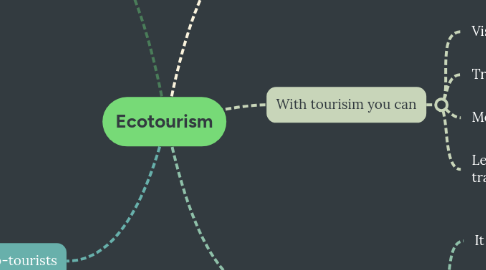
1. Conclusion
1.1. Ecotourism is
1.1.1. Preserve
1.1.1.1. Being responsible with the nature
1.1.2. Harmony and peace
1.1.2.1. Between the local and the visitor
1.1.3. Help satisfy local's needs
1.2. Tourism is a powerful
1.2.1. It can be a way for environment conservation
1.3. Plan and research for an eco-friendly travel
2. Eco-tourists
2.1. Avoid
2.1.1. Transport that pollutes the environment
2.1.2. Paying to view animals in captivity
2.2. How can we be good tourists?
2.2.1. Be open mind
2.2.2. Be caring about the place you visit without judgment
2.2.3. Be Respectful
2.2.3.1. With local manners
2.2.3.2. With local values
2.2.3.3. With local's lifestyle
2.2.3.4. With local dress code
3. What is ecotourism?
3.1. Type of tourism that involves
3.1.1. Learn and preserve
3.1.1.1. Local History
3.1.1.2. Environmental Conservation
3.1.2. Understand and support
3.1.2.1. local people's needs
4. With tourisim you can
4.1. Visit delightful places
4.2. Try unique food
4.3. Meet diverse people
4.4. Learn more about cultures, traditions and distinct lifestyles
5. Benefits of ecotourism
5.1. It is a more fulfilling experience
5.1.1. It goes beyond just personal satisfaction
5.2. Eco-tourists benefit local communities
5.2.1. When they respect the local nature
5.2.2. When they help with local economy
6. Creates a sense of unity and cultural sensitivity
7. We introduce ourselves more deeply to a place, their people and their culture
7.1. We make a stronger connection
7.1.1. It makes us more emphatic and respectful with the place we are visiting
